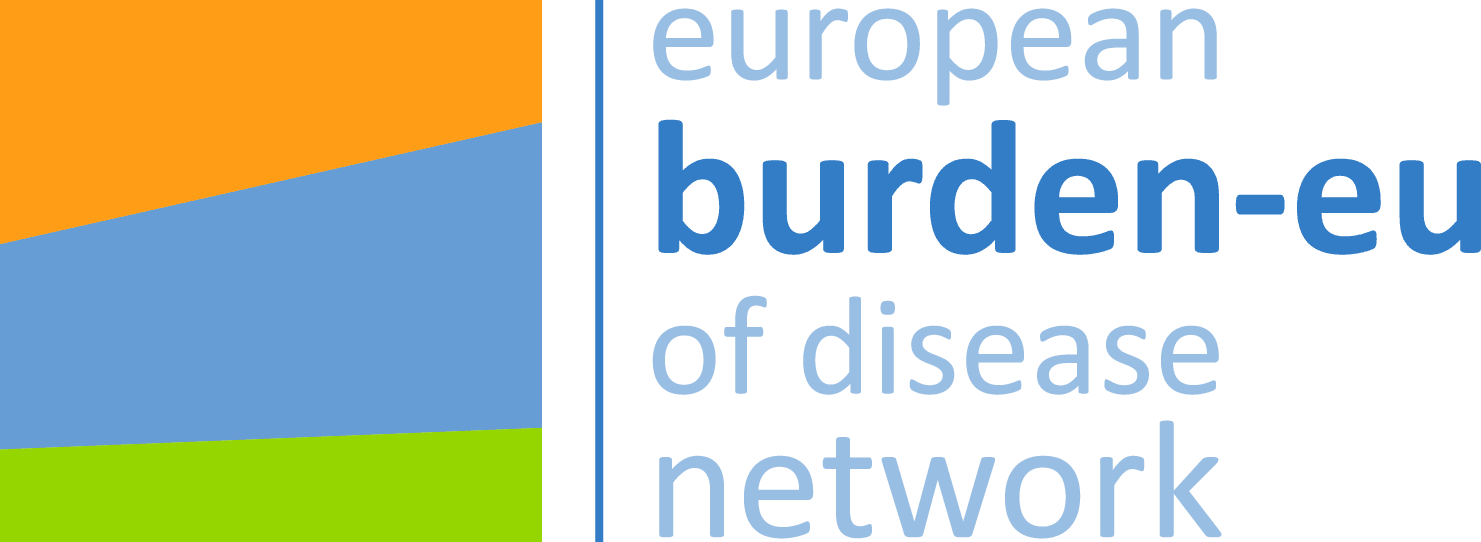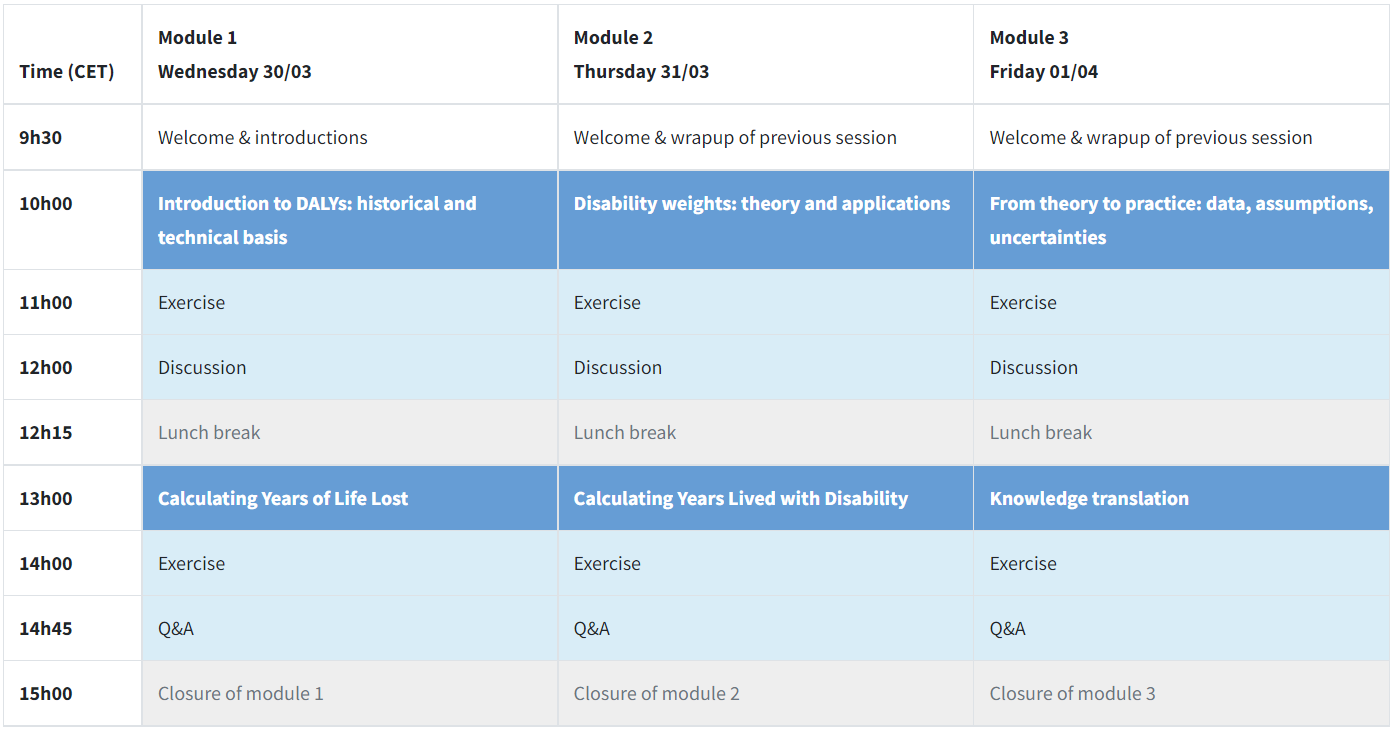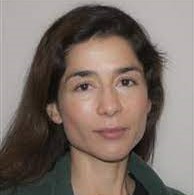European Burden of Disease Network
Aims and objectives
 What are the most relevant diseases in a country? Which risk factors are the strongest contributors to disease and death? How is the impact of different diseases evolving over time, and how does it compare between countries and within subnational units? As the need for prioritising the use of available resources constantly increases, a timely, sound and comprehensive answer to these fundamental questions is more than ever needed to inform public health decision making. Driven by the impact of the Global Burden of Disease study, several researchers and national and international health institutes have adopted the burden of disease approach to address these questions.
What are the most relevant diseases in a country? Which risk factors are the strongest contributors to disease and death? How is the impact of different diseases evolving over time, and how does it compare between countries and within subnational units? As the need for prioritising the use of available resources constantly increases, a timely, sound and comprehensive answer to these fundamental questions is more than ever needed to inform public health decision making. Driven by the impact of the Global Burden of Disease study, several researchers and national and international health institutes have adopted the burden of disease approach to address these questions.
The complexity of the burden of disease approach however, resulted in major disparities in research capacity across Europe. Furthermore, the current burden of disease landscape remains scattered, and researchers struggle to translate their findings to decision makers. The burden-eu COST Action will address these challenges by acting as a technical platform for integrating and strengthening capacity in burden of disease assessment across Europe and beyond. To achieve this mission, the Action is cooperating with the European Burden of Disease Network of the WHO Regional Office for Europe.
COVID-19 Burden of Disease Training School - in collaboration with PHIRI
The COVID-19 Burden of Disease Training School provides an introduction to burden of disease assessment, using COVID-19 as a case study. It provides public health professionals, and researchers from related fields, with practical knowledge about summary measures of population health, the historical background of the Global Burden of Disease study and its outputs. Furthermore, the Training School introduces the concept and rationale of the main metrics (YLLs, YLDs and DALYs), and underlines their application and importance or priority setting in public health policy and decision-making processes.
The Training School will be organized jointly by the burden-eu COST Action and the PHIRI project.
Structure
The Training School will be organized as three modules taking place from 30 March to 1 April 2022 in Ljubljana, if the COVID-19 measures will allow it . Each module will include theoretical and practical sessions, exercises and follow-up discussions. Each module is planned to take place from 9h30 to 15h00 CET, including a lunch break.
- Module 1 (Introduction to DALYs and YLLs) introduces summary measures of public health and the basic concept of burden of disease, DALYs and YLLs
- Module 2 (Introduction to YLDs) focuses on disability weights and the other main YLD inputs: input data, severity distributions, and comorbidity adjustment
- Module 3 (DALYs: theory to practice) addresses practical issues related to data, assumptions, and uncertainties, and puts a focus on knowledge translation
Registrations
Registrations closed on the 31st of January 2022 at midnight.
Eligibility and prerequisites
The Training School is open to all burden-eu members and partners institutions of the PHIRI project. The number of participants will be limited to a maximum of 30. If the number of applications would exceed the maximum number of available seats, candidates will be selected a) to prioritise motivated students and early career investigators, b) to ensure gender and geographical balance (and favouring representatives from Inclusiveness Target Countries), and c) to prioritise highly motivated candidates.
Teaching will be in English. Exercises will require a basic proficiency in MS Excel.
Program

Trainers
Brecht Devleesschauwer, Sciensano, Belgium
 Dr. Brecht Devleesschauwer is a senior epidemiologist at Sciensano (the Belgian institute for health) and visiting professor in Risk Analysis at Ghent University. He conducts policy-driven public health research in the domain of composite measures of population health and health inequalities. As a member of the World Health Organization Foodborne Disease Burden Epidemiology Reference Group (WHO/FERG), he contributed to the estimation of the global burden of foodborne disease. Currently, he is coordinating the Belgian National Burden of Disease Study, and chairing the European Burden of Disease Network (COST Action CA18218). Brecht holds PhD degrees in Public Health and Veterinary Sciences, and MSc degrees in Biostatistics and Veterinary Medicine.
Dr. Brecht Devleesschauwer is a senior epidemiologist at Sciensano (the Belgian institute for health) and visiting professor in Risk Analysis at Ghent University. He conducts policy-driven public health research in the domain of composite measures of population health and health inequalities. As a member of the World Health Organization Foodborne Disease Burden Epidemiology Reference Group (WHO/FERG), he contributed to the estimation of the global burden of foodborne disease. Currently, he is coordinating the Belgian National Burden of Disease Study, and chairing the European Burden of Disease Network (COST Action CA18218). Brecht holds PhD degrees in Public Health and Veterinary Sciences, and MSc degrees in Biostatistics and Veterinary Medicine.
Juanita Haagsma, Erasmus MC, the Netherlands
 Dr. Juanita Haagsma, PhD in health sciences, works as Assistant Professor at the Department of Public Health at the Erasmus MC, University Medical Center Rotterdam, The Netherlands. Her research focuses mainly on burden of disease estimates of injury and quantifying long-term consequences of injury in particular. For several years, she worked as Assistant Professor at the Institute for Health Metrics and Evaluation (IHME) at the University of Washington, where she was a member of the injuries team of the Global Burden of Disease study. She was responsible for the development and implementation of methods to calculate the global burden of injury. In addition, she has conducted several studies on disability weights, including a large disability weight study that collected responses from more than 30,000 people from four European countries.
Dr. Juanita Haagsma, PhD in health sciences, works as Assistant Professor at the Department of Public Health at the Erasmus MC, University Medical Center Rotterdam, The Netherlands. Her research focuses mainly on burden of disease estimates of injury and quantifying long-term consequences of injury in particular. For several years, she worked as Assistant Professor at the Institute for Health Metrics and Evaluation (IHME) at the University of Washington, where she was a member of the injuries team of the Global Burden of Disease study. She was responsible for the development and implementation of methods to calculate the global burden of injury. In addition, she has conducted several studies on disability weights, including a large disability weight study that collected responses from more than 30,000 people from four European countries.
Sara Monteiro Pires, National Food Institute, Denmark
 Dr. Sara Pires is a senior scientist at the National Food Institute, Technical University of Denmark. Her main areas of research are the burden and control of foodborne diseases. She has developed and applied methods to assess the burden of food-associated diseases at national and international level, and to provide evidence to guide public health policy for disease prevention. She is the chair of the Working Group on Infectious Diseases of the European Burden of Disease Network
Dr. Sara Pires is a senior scientist at the National Food Institute, Technical University of Denmark. Her main areas of research are the burden and control of foodborne diseases. She has developed and applied methods to assess the burden of food-associated diseases at national and international level, and to provide evidence to guide public health policy for disease prevention. She is the chair of the Working Group on Infectious Diseases of the European Burden of Disease Network
Subscribe to our newsletter
the fields marked with * are required
PHIRI Work tools
 |
This project has received funding from the European Union’s Horizon 2020 research and innovation programme under grant agreement No 101018317. Disclaimer - Privacy policy |
Version 10.0
